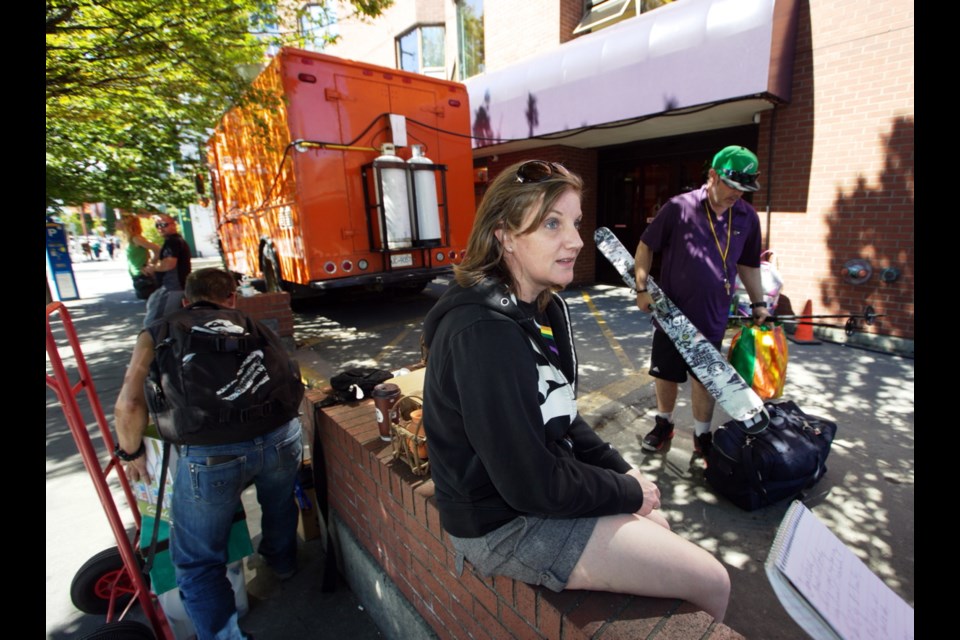Having a place to call home after months of living in the tent city on the courthouse lawn and years of living in shelters feels like a new beginning, says one former camper.
“I am literally feeling myself decompress from being on the street. I’m more myself socially, my muscles have relaxed,” Jaime Green said outside the former Central Care Home on Johnson Street, which was recently purchased by the province to house tent-city residents.
Green moved into the supportive-housing complex last week and was helping the last tent-city residents move their belongings in on Monday. They will pay $375 a month rent, the maximum shelter allowance for those on disability assistance, she said.
Monday was the deadline Supreme Court Chief Justice Christopher Hinkson gave for the tent city to be cleared out and residents offered suitable housing.
The tent city began last fall when homeless campers discovered city bylaws banning tenting in parks during daylight hours did not apply to the small plot of provincial land. Over the past 10 months, hundreds of homeless people have stayed at the camp — making it a focal point for the issue of homelessness in the city. Law enforcement struggled with increased reports of crime while neighbours complained of safety concerns as structures and tenters’ numbers grew.
The province lost an initial bid for a court injunction to close the camp on the grounds that the homeless would be at greater risk on the streets. To address the problem, the province spent $26 million to purchase three buildings and fund three shelters to house the campers. In July, Hinkson ruled in favour of closing the camp, provided adequate housing was available.
Over the past month, the homeless camp has slowly been dismantled and the majority of residents moved to Choices transitional shelter in View Royal and the former care home on Johnson Street, converted into 147 supportive-housing units.
On Monday, Raging Grannies Alison Acker and Virginia Daniel sat in lawn chairs at the entrance to the camp as disposal crews worked to remove garbage from the site.
“The purpose is really to be a witness to any problems that might arise,” said Acker, who has visited the tent city a few times a week since Christmas. “It’s a wonderful protest camp, but it fulfilled its purpose. ... It allowed people to rest and make friends, build a family. They are better off because of it.”
Across the street, Christ Church Cathedral held hourly vigil readings for the camp and planned an evening service for anyone involved. For the last six months, a vigil candle has burned on the high altar, with a cross made by a tent-city resident.
Neighbours and passersby peered into the camp on Monday, some walking in for the first time. Stephen Hammond, who helped form a residents’ group called Mad as Hell opposed to the camp, said he hopes all the tenters will be gone and not allowed back.
“This has gone on for 10 months. Everyone hopes the people needing help are getting it,” he said. “As for the criminals who stole from us and assaulted us, I hope they get jail time.”
Super InTent City, an advocacy group made up of campers, issued a press release with housing demands on move-out day.
The listed items include affordable, permanent and diverse housing options with no surveillance, a complaints process, fair rental agreements, cleanliness and permission for guests.
“These are ordinary and reasonable things we all want in housing,” said Bernie Pauly, a University of Victoria researcher who advocated for tent-city residents. “It’s critical that people who have lived experience are involved in how housing is designed and organized for them.”
Green said tent-city residents have already spoken to managers of the Johnson Street building — Vancouver-based PHS Community Services Society — about creating a residents advisory council.
“The building should reflect us,” she said. “It’s been a real struggle to be heard.”
Green worked in logistics for the military as a civilian contractor before a mental-health breakdown led her to become homeless six years ago.
“I was in Afghanistan for a year. Being homeless is by far more traumatizing,” said Green, who was diagnosed as schizophrenic.
“My plans are to get a grip on my mental illness. I’m still coming to understand it.”
Green said she would like to get a part-time job now that she has an address. She’s looking forward to being able to have family and friends over for a cup of tea and sharing space with her partner.



